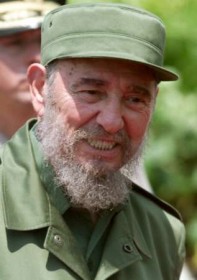A US cable released by WikiLeaks today said that Cuban Leader Fidel
Castro came close to dying in July, 2006 after rejecting a colostomy
for diverticulitis of the colon.
He also came close to dying again around October that year.
The cable (see below) gave an insight into reported differences
among those in his medical team.

The Cuban leader transferred power to his brother Raul Castro on
July 31, 2006, days after he fell ill reportedly on a flight
between Holguin and Havana. The diagnosis was said to be
diverticulitis of the colon and in the days that followed, the
US cable which originated from the Havana interest section on March 16,
2007 related differences among the doctors tending him and the
removal from the job of one of his physicians.
The cable then went on to discuss prognostications for how long
Fidel Castro would live and the impact of his condition
on the Cuban people.
Fidel Castro’s health in recent months has
improved significantly and he has made appearances with visiting
dignitaries and given interviews to several journalists.
The 84-year-old has also continued to author articles in the Cuban
press.
The cable say that while he was alive Fidel Castro’s presence will
have a “chilling and retardant” effect on Cuban society.
 C O N F I D E N T I A L SECTION 01 OF 02 HAVANA 000258
C O N F I D E N T I A L SECTION 01 OF 02 HAVANA 000258
SIPDIS
SIPDIS
E.O. 12958: DECL: 03/16/2017
TAGS: PGOV PINR CU
SUBJECT: CUBA: HOW BELIEVABLE IS A FIDEL CASTRO COMEBACK?
HAVANA 00000258 001.3 OF 002
Classified By: COM Michael E. Parmly; Reasons 1.4 (b/d)
¶1. (C) Summary: XXXXXXXXXXX
passed us a document March 14 that describes Fidel Castro’s
declining health, as analyzed by a respected, retired Cuban
doctor. The document concludes by saying that Castro has a
terminal condition, and will suffer an inevitable
deterioration of his faculties until he dies. But he is not
about to die “immediately.” This contrasts with a flurry of
news and public statements by key regime figures about Castro
making a comeback, including his having spoken to Hugo Chavez
on the phone while the latter was in Haiti. We believe that
a full comeback is unlikely, but that Fidel Castro is more of
a presence behind the scenes — and even “on stage” as a
presence — than he was a few months ago. End Summary.
¶2. (U) Media have reported increased activity on the part of
Fidel Castro this past week: Speaking on the phone to Hugo
Chavez during the Venezuelan’s visit to Haiti; and receiving
Colombian author and long-time sympathizer Gabriel Garcia
Marquez. Both Foreign Minister Felipe Perez Roque (in
Europe) and Parliamentary Speaker Ricardo Alarcon stated
publicly that Fidel Castro was making a comeback and would
return to the GOC’s helm. Alarcon’s statement included
Castro’s “winning reelection for president” in 2008. Interim
dictator Raul Castro has kept a low profile during the past
few weeks.
¶3. (C) XXXXXXXXXXX, on Wednesday evening March 14, passed COM and
Pol-Econ Counselor a document XXXXXXXXXXX. The
document traces Fidel Castro’s critical condition from its
onset last July, through the various ups and downs with his
local medical staff and with the visiting Spanish doctor,
Garcia Sabrido. Most of this repeats what has previously
been reported, with one new development: Castro has fired
his long-time personal physician, Dr. Selman. Informal
translation of this document follows in Para 4.
¶4. (C) Doctor’s Statement:
“The illness began in the plane from Holguin to Havana (Note:
after a full day of July 26, 2006 activities. End note). As
this was a short flight there was no doctor aboard and they
had to land urgently once they knew of his bleeding. He was
diagnosed with diverticulitis of the colon.
This illness is characterized by diverticulae in the large
intestine, generally. A diverticula is a protuberant sack in
a segment of the intestine, not in itself necessarily
dangerous. Waste gets trapped in them, for example.
Nevertheless, they can cause hemorrhaging, inflammation and
infection, resulting in diverticulitis. (Health Unit
Comment: Simple diverticulitis, without perforation,
hemorrhaging or infection, is treatable. End Comment.)
The condition requires surgery when the diverticulae are
gigantic, because they are more likely to become infected and
burst.
He had a perforation in the large intestine and needed to
have a colostomy done; which he opposed, saying that they
should splice out the infected part and reattach the
intestine to his colon. Dr. Selman, who was chief of the
medical team, was in agreement, but the rest of the team
opposed. But Fidel Castro, capriciously, did not permit the
colostomy.
With the passage of time, as the colon was infected, the
operation collapsed and the reattached part separated. They
had to operate again, but found a fistula. It wasn’t known
at that time what he had, but normally a fistula in the
abdomen has the effect of blocking the digestion of
food–resulting in the loss of 40 pounds. They began to feed
him by IV serum, and they used a Korean-made device to treat
the fistula, which didn’t have much success. That was when
they called in the Spanish doctor, the one who said that they
Cuban team had done what they could, but the correct
treatment should have been a colostomy.
At that point they removed Selman from the team, who is now
working as a low-level doctor someplace else.
XXXXXXXXXXX
HAVANA 00000258 002.3 OF 002
this illness is not curable, and will not, in her opinion,
allow him to return to leading Cuba. He won’t die
immediately, but he will progressively lose his faculties and
become ever more debilitated until he dies.”
¶5. (C) This report is consistent with our reporting that
Fidel Castro probably came close to death in July, 2006, and
then again around October. Since then, as we have seen in
video and audio broadcasts, Castro has been able to engage
with Hugo Chavez and others for limited periods of
conversation and other forms of carefully controlled
activity. He has not appeared live on TV or in any other
public context during the entire period of his critical
illness, which caused him to miss the September, 2006
Non-Aligned summit and a large-scale celebration of his
birthday and armed forces day in December, 2006.
¶6. (C) Cubans react to news about Fidel Castro with
resignation and wild speculation. XXXXXXXXXXX
told us March 15 that he thought last month’s taped call-in
by Castro to Hugo Chavez’s radio show was fake and that he
would die by May. XXXXXXXXXXX, described the Castro illness as having a similar
effect on the public as the Pope’s 1998 visit: Greatly
raised expectation for change, followed by disappointment and
reversion to the totalitarian norm.
¶7. (C) Comment: We are missing too many variables to be able
to predict accurately how many more months Fidel Castro will
live. Frankly, we don’t believe anyone, including Castro
himself, can state that with certainty. However, while he is
still alive, even in a reduced capacity, his presence has a
chilling and retardant effect on Cuban society. The high
expectations for change are still out there, but are mostly
associated with the idea that the dictator has to die first
before anything substantial will happen.
PARMLY









